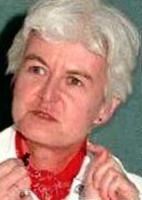Tribute to Sue Briggs
AWMS Honorary Life Member

In December 2020, the Australasian Wildlife Management Society lost one of its highly valued members when Sue Briggs died.
Sue had been a keen supporter of the AWMS since its inception and took over the treasurer’s role from me in 1991/1992 after I filled the role for the first four years of the society’s existence. She saw the AWMS as a potential useful vehicle for bridging the science/policy divide, an issue she worked on ceaselessly throughout her career. This is where we established strong common ground as I also recognised this as a weak link in the formulation and implementation of good public policy on natural resource management and wildlife management. Along with John Parkes from New Zealand, we organised the 2010 AWMS two-day symposium “Research and Policy – Spanning the Divide”.
We underestimated the interest in this topic and because of the size of the venue had to turn people away. We always regretted misjudging interest in this topic, but Sue capitalised on the information arising from that symposium. In particular, she used Mark Aarons’ excellent presentation on integrating science with politics with her students at the University of Canberra throughout the next decade. Mark was Deputy Chief of Staff for Bob Debus, Minister for the Environment in NSW, working specifically on national park and natural resource management issues before becoming the premier’s advisor on Climate Change and Natural Resource Management. He knew how politics worked and what researchers needed to do to get their work translated into policy.
Sue’s early work in the NSW NPWS was on wetlands and game birds (duck hunting). Wildlife and game bird management was then a male dominated world where only a feisty female such a Sue could survive with the many egos involved. Being a “take no prisoners” type of person, Sue was able to influence the science and policy behind the game bird programs in the eastern states of Australia, gaining the respect of many people.
Wetlands were one of Sue’s greatest loves and in her they found a wonderful advocate. From her initial work on work on the mangrove wetlands of the Lane Cover River (Sydney), then the wetlands in the Northern Tablelands, she studied wetland ecology in inland New South Wales where she confirmed the important role wetting and drying cycles play in nutrient cycling. These wetlands are ephemeral, and their dependent biota has evolved to survive such variation. Sue recognised the impact an ever-expanding irrigation industry would have on inland wetlands. Focusing on the iconic Macquarie Marshes, she lobbied strongly for water to be allocated to the environment so that wetlands would have a chance of surviving the impact of the irrigation industry. She was the key figure in having the first environmental water allocation made in Australia.
In 1980 the NSW government allocated 18500ML to the Macquarie Marshes. Working with CSIRO scientists and the NSW Water Resources Commission, Sue closely monitored the effects of this environmental allocation, proving it was inadequate and thus convinced the government to increase the allocation to 50000ML in 1983. This was an outstanding achievement at the time which set the scene for the important role of wetlands and floodplains within the contested social, economic, cultural, and ecological environments of today. She thus established herself as one of the female pioneers in wildlife and natural resource management in Australia.
Sue also contributed to marine park management in New South Wales and in the latter years of her career with the NSW NPWS she played a key role in setting policy and regulations around the highly contentious issue of vegetation management. As a pragmatic conservationist Sue successfully influenced government to set practical laws and regulations which underpinned a policy which was universally accepted. This practical approach angered many purists, but their response did not phase Sue. She communicated well with landholders and with ministerial staff, spanning that critical divide between research and policy. She did not tolerate people who refused to operate in the real world and was quick to tell them so.
Sue used to say to me, as she no doubt would to others “I’m a bit mad you know – but don’t worry about it”. A fine example of this was on Kangaroo Island in 2012 on an AWMS conference field trip. We were in the field on an extremely hot day and stopped by a dam where Pip Masters spoke on the pest program on the island. Fronting an attentive group, Pip was suddenly interrupted by Sue exclaiming loudly, “I’m so hot!”, whereupon she walked fully clothed into the dam, up to her neck, where she remained for the duration of the presentation.
After retiring from NPWS Sue became a highly respected educator and mentor at the Australian National University and the University of Canberra from 2012 until her death. She taught and co-taught a range of subjects such as environmental planning and assessment, ecology and biodiversity as well as environmental conflict management while supervising honours and post-graduate students. She utilised other experienced AWMS members to run lectures or tutorials for her students. Her students and many of her early professional colleagues whom she mentored held her in the highest regard.
Sue’s achievements have been recognised through her honorary life membership of AWMS, her Member of the Order of Australia (AM) award “for service to conservation and the environment through research and advisory roles supporting natural resource management and policy development”. She also received awards from the Institute of Applied Ecology at the University of Canberra. Sue is survived by sister Juel and brother Rob.
Terry Korn PSM
Hon. Life Member of AWMS
Public Officer
Chair, AWMS Public Fund Management Committee